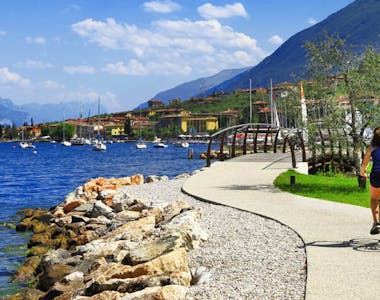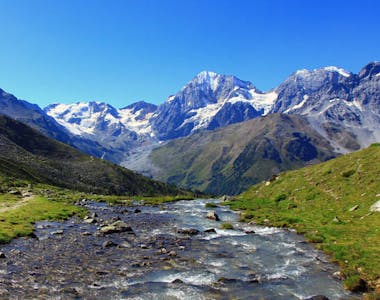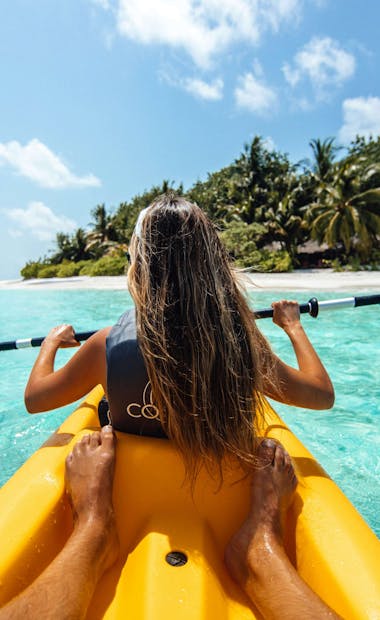Italy Cycling Holidays
Exploring Italy on two wheels. From the Cypress Trees of Tuscany to the Amalfi Coast
Popular tours
- Save1%
 View Tour
View TourCycle Tuscany - 8 Days
- Florence to Pisa
- Age group: 14 - 99
- Max group size: 15
Was:£1,995From£1,975 - Save1%
 View Tour
View TourCycle Dolomites, Lake Garda and Verona - 8 Days
- Venice to Venice
- Age group: 16 - 79
- Max group size: 16
Was:£2,165From£2,143 - Save1%
 View Tour
View TourCycle Puglia 2026 - 8 Days
- Altamura to Monopoli
- Age group: 16 - 79
- Max group size: 16
Was:£1,895From£1,876 - Save1%
 View Tour
View TourCinque Terre: Hike, Bike & Kayak - 8 Days
- Levanto to Santa Margherita Ligure
- Age group: 15 - 99
- Max group size: 12
Was:£1,950From£1,930 - Save1%
 View Tour
View TourCycle Puglia 2027 - 8 Days
- Altamura to Monopoli
- Age group: 16 - 79
- Max group size: 16
Was:£1,955From£1,935
Italy Cycling Holidays
Italy: A Cycling Paradise Awaits
Nestled in the heart of Europe, Italy beckons with its rich history, stunning landscapes, and mouth-watering cuisine. While this enchanting country is renowned for its art, architecture, and iconic landmarks, there's another side of Italy that awaits the adventurous traveller: its captivating cycling routes. Embark on a guided cycling holiday in Italy and unlock a world of unforgettable experiences on two wheels.
Imagine pedalling through picturesque vineyards, rolling hills dotted with olive groves, and quaint medieval villages that seem frozen in time. Italy's diverse terrain offers a perfect blend of challenging climbs, gentle coastal paths, and scenic countryside routes, catering to cyclists of all levels. Whether you're an experienced rider seeking the thrill of conquering legendary mountain passes or a leisure cyclist yearning to immerse yourself in the beauty of the Italian countryside, there's a guided cycling holiday in Italy that caters to your every desire.
From the enchanting regions of Tuscany and Umbria, with their undulating landscapes and charming hilltop towns, to the dramatic Amalfi Coast, where cliffside roads wind their way along the sparkling Tyrrhenian Sea, Italy provides a backdrop of unparalleled beauty for your cycling adventure. Traverse the serene shores of Lake Garda, cycle through the rolling vineyards of Piedmont, or challenge yourself on the legendary routes of the Dolomites. Each region unveils its own unique charm, cultural heritage, and culinary delights, ensuring that every day of your journey is filled with discovery and delight.
But a guided cycling holiday in Italy offers more than just exceptional routes and breath-taking scenery. It provides the opportunity to delve into the country's rich history and vibrant culture. Picture yourself exploring the ancient ruins of Pompeii, savouring world-class wines in the Chianti region, or indulging in authentic Italian cuisine, from delectable pasta dishes to creamy gelato. Your cycling adventure becomes a holistic experience that immerses you in the very essence of Italy.
Guided cycling holidays in Italy offer the perfect balance of support and freedom. With an experienced guide leading the way, you can confidently navigate the routes, knowing that local knowledge and assistance are at your disposal. From logistics and accommodations to cultural insights and hidden gems, your guide will ensure a seamless and enriching journey, leaving you free to focus on the pure joy of cycling and embracing the wonders of Italy.
Whether you're a seasoned cyclist or a casual rider, Italy's guided cycling holidays offer a unique blend of active exploration, cultural immersion, and natural beauty. It's a chance to create memories that will last a lifetime, as you pedal through ancient history, savour the flavours of Italian gastronomy, and forge connections with fellow cyclists from around the world.
So, dust off your bike, pack your curiosity, and prepare to embark on an extraordinary adventure. Italy awaits, ready to captivate your senses, ignite your spirit of adventure, and unveil the magic of cycling in one of the world's most enchanting destinations.
Popular Cycling Holidays In Italy
Italy, with its diverse landscapes and rich cultural heritage, offers a plethora of popular cycling holiday routes that cater to riders of all levels. Here are some of the most sought-after cycling routes in Italy:Tuscany: The rolling hills of Tuscany provide a picturesque backdrop for cycling enthusiasts. The region's winding roads lead through vineyards, olive groves, and charming medieval towns. The famous Strade Bianche, with its white gravel roads, offers a unique and challenging cycling experience. The route from Florence to Siena, passing through the heart of the Chianti wine region, is a favorite among cyclists seeking both natural beauty and cultural immersion.
Amalfi Coast: The Amalfi Coast, with its dramatic cliffs and stunning views of the Tyrrhenian Sea, attracts cyclists from around the world. The coastal road winds its way through enchanting towns such as Positano, Ravello, and Amalfi, offering challenging climbs and exhilarating descents. Cycling along the Amalfi Coast provides a sensory feast, combining breathtaking scenery with the region's renowned gastronomy and Mediterranean charm.
Dolomites: The Dolomites, a mountain range in northeastern Italy, offer some of the most iconic and challenging cycling routes in the world. With their majestic peaks, winding passes, and panoramic vistas, the Dolomites provide an awe-inspiring backdrop for cyclists. Routes like the Sella Ronda, Giro d'Italia stages, and the iconic Passo dello Stelvio attract cyclists looking for demanding climbs and epic mountain scenery.
Lake Como: Nestled in the foothills of the Italian Alps, Lake Como is a cyclist's paradise. The route around the lake takes riders through charming lakeside towns, past elegant villas, and offers stunning views of the surrounding mountains. Cyclists can choose to tackle challenging climbs or enjoy leisurely rides along the lake's serene shores, immersing themselves in the beauty of this iconic destination.
Sicily: The island of Sicily offers a unique blend of history, culture, and natural beauty. Cycling routes traverse the rugged coastline, ancient Greek ruins, and charming Baroque towns. The challenging ascent up Mount Etna, Europe's most active volcano, is a highlight for adventurous cyclists. Sicily's mild climate, diverse landscapes, and culinary delights make it an increasingly popular choice for cycling holidays.
Veneto and the Prosecco Region: The Veneto region, with its gentle rolling hills and charming countryside, is home to the Prosecco wine region. Cycling routes wind through vineyards, quaint villages, and historic sites. The Prosecco Route, known as the "Strada del Prosecco," offers a delightful mix of scenery, wine tastings, and gastronomic experiences.
These are just a few examples of the most popular cycling holiday routes in Italy. Each route showcases the country's unique charm, combining breathtaking landscapes, rich history, and culinary delights. Whether you're seeking challenging climbs, coastal panoramas, or cultural exploration, Italy has a cycling route to suit your preferences and create a memorable adventure.
How fit do I need to be for cycling holiday?
The beauty of guided cycling holidays is that they cater to a wide range of fitness levels, ensuring that everyone can partake in the adventure. Whether you're an experienced cyclist or a casual rider, there are options available to suit your abilities and preferences.
When choosing a guided cycling holiday, it's essential to consider the specific trip's difficulty level. Travel agencies often provide detailed information about the terrain, average daily distances, and elevation gains, allowing you to gauge the physical demands involved. Some tours may be designed for more experienced cyclists, featuring longer distances or more challenging routes, while others may offer shorter, more relaxed rides suitable for beginners or those seeking a leisurely pace.
It's worth noting that most guided cycling holidays are designed with a focus on exploration, cultural immersion, and enjoyment rather than pushing physical limits. The pace is usually relaxed, allowing ample time to soak in the surroundings and explore points of interest along the way. Frequent stops and rest breaks are incorporated into the itinerary, ensuring that participants can recharge and appreciate the journey without feeling overly fatigued.
However, it's advisable to have a basic level of fitness before embarking on a guided cycling holiday. Regular cardiovascular exercise, such as cycling, jogging, or swimming, can help improve your stamina and endurance. It's beneficial to engage in some pre-trip training to prepare your body for the physical demands of cycling, especially if you anticipate encountering hilly or mountainous terrain.
Remember, the primary goal of a guided cycling holiday is to enjoy the experience, so listen to your body and take breaks as needed. Don't be discouraged if you need to hop off the bike and walk a challenging section or take a rest day during the trip. The knowledgeable guides are there to support and assist you along the way, ensuring that you have a fulfilling and enjoyable experience regardless of your fitness level.
Ultimately, guided cycling holidays are designed to be inclusive and accessible, allowing cyclists of varying fitness levels to partake in the adventure. By choosing a trip that aligns with your abilities, engaging in some pre-trip training, and maintaining a positive mindset, you'll be well-equipped to embrace the journey and create lasting memories on your guided cycling holiday.
When is the best time to visit Italy for a cycling holiday?
The best time to visit Italy for a cycling holiday largely depends on the specific region you plan to explore and your preferred cycling conditions. Italy's diverse climate and geography offer a range of options throughout the year. Here are some general guidelines for each season:
Spring (April to June): Spring is often considered an ideal time for cycling in Italy. The weather is mild, with pleasant temperatures ranging from 15 to 25 degrees Celsius (59 to 77 degrees Fahrenheit), making it comfortable for riding. The countryside is in full bloom, and the landscapes are vibrant and picturesque. Spring also tends to be less crowded compared to the peak tourist season, allowing for a more serene and enjoyable cycling experience.
Summer (July to August): Summer in Italy can be quite hot, especially in southern regions. The temperatures can soar above 30 degrees Celsius (86 degrees Fahrenheit), particularly in July and August. However, if you plan to cycle in the northern parts of the country or at higher altitudes, such as in the Dolomites, the temperatures may be more moderate. It's important to stay hydrated, plan your rides for the cooler parts of the day, and choose routes with shaded areas or coastal breezes to mitigate the heat.
Autumn (September to October): Autumn is another favorable season for cycling in Italy. The weather remains pleasant, with temperatures ranging from 15 to 25 degrees Celsius (59 to 77 degrees Fahrenheit). The summer crowds start to dwindle, allowing for a more peaceful and relaxed cycling experience. Autumn also brings stunning foliage, particularly in regions like Tuscany and the Dolomites, adding a touch of vibrant colors to your rides.
Winter (November to February): Winter in Italy can be chilly, especially in the northern and mountainous regions. The temperatures vary depending on the specific location, but it is generally colder and wetter. However, if you plan to cycle in regions with milder climates like Sicily or southern coastal areas, winter can still offer enjoyable cycling conditions. It's important to check the weather forecast and be prepared for occasional rain or snow.
It's worth noting that Italy's climate can vary from region to region, so it's essential to research and consider the specific conditions of your chosen destination. Additionally, popular cycling events and races, such as the Giro d'Italia, may impact availability and crowds, so it's advisable to check the event calendar if you wish to avoid those periods.
Ultimately, the best time to visit Italy for a cycling holiday depends on your preferences, the region you plan to explore, and the type of cycling experience you seek. Whether you prefer the vibrant colors of spring, the warm temperatures of summer, the pleasant conditions of autumn, or the milder winters in the southern regions, Italy offers something for every cyclist throughout the year.
Can I bring my own bike?
In many cases, you can bring your own bike on a guided cycling holiday. We understand that cyclists may have a strong attachment to their own bikes and prefer to ride on familiar equipment. Bringing your own bike can provide a sense of comfort, confidence, and optimal performance during the trip.
However, it's important to note that there may be certain considerations and arrangements to make when bringing your own bike on a guided cycling holiday. Here are a few factors to keep in mind:
Compatibility: Ensure that your bike is suitable for the terrain and conditions of the specific guided cycling tour you plan to join. Different trips may have varying requirements in terms of bike type (road bike, hybrid bike, mountain bike, etc.) and features (gearing, tire width, suspension, etc.). Consult with the travel agency or tour operator to confirm that your bike is appropriate for the itinerary.
Transportation logistics: Depending on the destination and the logistics of the tour, you may need to make arrangements for transporting your bike to the starting point or for storing it during the trip. Some travel agencies offer assistance with bike transportation, while others may provide recommendations for reliable bike shipping services. If you're traveling by air, familiarize yourself with the airline's policies regarding bike transportation and any associated fees.
Maintenance and repairs: It's essential to ensure that your bike is in good working condition before the trip. Conduct a thorough inspection, checking the tires, brakes, gears, and overall mechanical integrity. Consider getting a tune-up or service from a professional bike shop to address any potential issues and make sure your bike is ready for the challenges of the guided cycling holiday. It's also helpful to bring essential tools, spare tubes, and basic repair equipment in case of any minor mechanical problems during the tour.
Personal responsibility: When bringing your own bike, you'll be responsible for its care and maintenance throughout the trip. This includes securely locking your bike when not in use and taking precautions to prevent theft or damage. Follow the guidelines provided by the tour guides or travel agency regarding bike storage at accommodations or during sightseeing stops.
Alternate options: If bringing your own bike is not feasible or desirable, most travel agencies also provide rental bikes as part of their guided cycling holiday packages. Rental bikes are often well-maintained and suitable for the specific terrain and route of the tour. Renting a bike can be a convenient option, particularly if you want to avoid the hassle of transporting your own bike or if you prefer to try out a different type of bike for the trip.
It's crucial to communicate with the travel agency or tour operator well in advance to discuss your intention to bring your own bike. They can provide you with specific information, requirements, and recommendations tailored to the guided cycling holiday you're interested in.
Bringing your own bike on a guided cycling holiday can enhance your overall experience, offering familiarity and personalization. It allows you to explore new destinations while riding on your preferred equipment, bringing a sense of comfort and continuity to your cycling adventures.
How does the rooming work on tours?
Cycling tours typically involve a set itinerary where you travel with a group of fellow travellers and a tour leader/guide. Accommodation arrangements vary depending on the specific tour you choose. Here are some common aspects of rooming arrangements on small group tours:
Shared Rooms: In order to promote camaraderie and facilitate interaction among group members, most tours arrange shared accommodation. This means you will be paired with another member of the same gender from the group to share a room. Roommates may sometimes change periodically throughout the tour.
Single Supplement: If you prefer to have your own room and privacy, you may have the option to pay a single supplement fee. This additional fee allows you to have your own room for the duration of the tour. However, please note that single supplements can vary in cost and availability.
Roommate Matching: Tour operators usually offer roommate matching services, where they try to pair you with a suitable roommate based on your preferences, such as age range. This can help ensure compatibility and a more enjoyable experience for all participants.
Rooming Preferences: When booking your small group tour, it's important to communicate your rooming preferences to the tour operator. If you have specific requirements or preferences, such as sharing with a friend or a specific roommate request, it's advisable to inform the tour operator during the booking process.
It's important to carefully read the tour details and inclusions provided by the tour operator to understand their specific rooming policies. If having your own room is a priority, make sure to inquire about the availability of single supplements and any associated costs before booking your tour.
Keep in mind that while sharing a room with a fellow traveller can be a great way to meet new people and build connections, having your own room provides more privacy and flexibility. Consider your preferences and the dynamics of the tour when deciding whether to opt for a shared room or pay for a single supplement.
Remember to communicate your needs and preferences clearly with the tour operator during the booking process to ensure a comfortable and enjoyable accommodation experience on your cycling tour.
What basic gear will I need?
When preparing for a cycling holiday, having the right gear is essential to ensure your comfort, safety, and enjoyment throughout the journey. While specific gear requirements may vary depending on factors such as destination, terrain, and personal preferences, here are some basic gear items that are typically recommended for a cycling holiday:
Bicycle: A well-maintained and appropriate bicycle is the foundation of your cycling holiday gear. Choose a bike that is suitable for the terrain and conditions of your trip, whether it's a road bike, mountain bike, hybrid bike, or touring bike. Ensure that your bike is in good working order, with properly inflated tires, functioning brakes, and smooth shifting.
Helmet: Wearing a helmet is crucial for your safety while cycling. Invest in a quality helmet that fits properly and provides adequate protection. Look for helmets that meet safety standards and have adjustable straps and ventilation for added comfort.
Clothing: Wear comfortable and breathable cycling clothing that is suitable for the weather conditions of your destination. Consider items such as cycling jerseys, padded shorts or bibs, moisture-wicking socks, and cycling gloves. Dress in layers to accommodate temperature changes and pack a lightweight waterproof or windproof jacket in case of inclement weather. Don't forget to bring comfortable off-the-bike clothing for your downtime.
Footwear: Choose cycling shoes that are compatible with your bike's pedals. Whether you opt for clipless shoes or flat pedals, ensure that your footwear provides a secure and comfortable fit. Consider bringing an extra pair of shoes for off-bike activities and walking.
Accessories: There are several accessories that can enhance your cycling experience. These include:
- Cycling gloves: Provide cushioning, grip, and protection for your hands during long rides.
- Sunglasses: Protect your eyes from glare, UV rays, and debris.
- Cycling socks: Wicking socks designed specifically for cycling can keep your feet comfortable and help prevent blisters.
- Water bottles or hydration pack: Stay hydrated during your rides by carrying water or sports drinks.
- Bike lights: If you plan to cycle during low-light conditions or at night, make sure your bike is equipped with front and rear lights for visibility and safety.
- Bike lock: Bring a sturdy bike lock to secure your bike when making stops or when leaving it unattended.
- Bike repair kit: Carry essential tools, spare tubes, tire levers, a mini pump or CO2 inflator, and a patch kit to handle basic bike repairs on the go.
Navigation: Depending on your preferences, you may want to bring a cycling-specific GPS device, a smartphone with navigation apps, or printed maps and route descriptions to help you navigate the cycling routes. Ensure that you have a secure and accessible mount for your GPS or phone.
Personal Items: Don't forget to pack personal items such as sunscreen, lip balm, insect repellent, a small first-aid kit, and any necessary medications. Carry a small backpack or saddlebag to store these items, as well as your wallet, phone, identification, and other essentials.
It's important to research and consider the specific requirements and recommendations for your chosen cycling holiday. The travel agency or tour operator organizing the trip may provide additional gear guidelines and suggestions tailored to the destination and itinerary. Packing the right gear will help you make the most of your cycling adventure and ensure a comfortable and enjoyable experience.
Are cycling helmets compulsory?
All of the tours we feature require you to wear a helmet when cycling. It is strongly recommended to wear a helmet for your own safety while cycling. Helmets are designed to protect your head in the event of a fall or collision and can greatly reduce the risk of head injuries. Even if it is not mandatory, wearing a helmet is a responsible choice that promotes safety and ensures you are well-protected during your cycling adventures.
When packing for your cycling holiday, it is wise to bring your own helmet to ensure a proper fit and comfort. If you do not own a helmet or prefer not to carry one, you can inquire with the tour operator or travel agency if they provide helmets or if they can recommend a reliable rental service at your destination.
Remember, safety should always be a top priority when engaging in any cycling activity, and wearing a helmet is a simple and effective measure to protect yourself while enjoying your guided cycling holiday.
Do I need a visa to travel to Italy?
The visa requirements for visiting Italy depend on your nationality and the purpose and duration of your stay. Here are some general guidelines:
European Union (EU) Citizens: Citizens of EU member countries do not need a visa to enter or stay in Italy. They have the right to travel freely within the Schengen Area, which includes Italy, for stays up to 90 days.
Non-EU Citizens: If you are not a citizen of an EU country, you may need a visa to enter Italy. The specific visa requirements vary depending on your nationality, so it's essential to check with the Italian embassy or consulate in your country or the relevant visa authorities for the most accurate and up-to-date information.
Schengen Visa: Italy is part of the Schengen Area, which comprises 26 European countries with a common visa policy. If you are a citizen of a country that is not exempt from the Schengen visa requirement, you will generally need to apply for a Schengen visa. This visa allows you to visit Italy and other Schengen countries for tourism or business purposes for a maximum of 90 days within a 180-day period.
Visa Exemptions: Some nationalities are exempt from the Schengen visa requirement for short-term visits. Citizens of certain countries, such as the United States, Canada, Australia, New Zealand, Japan, South Korea, and many others, can enter Italy and stay for up to 90 days within a 180-day period without a visa. However, it's important to note that the purpose of the visit should be tourism, business, or other activities that do not involve work or study.
Long-Term Visits: If you plan to stay in Italy for more than 90 days, whether for work, study, or other purposes, you will generally need to apply for a long-term visa or a residence permit. The specific requirements and application process will depend on the purpose of your stay.
It's crucial to check the visa requirements well in advance of your planned trip and allow sufficient time for the visa application process. It's recommended to consult the official website of the Italian embassy or consulate in your country or contact the relevant visa authorities for the most accurate and up-to-date information regarding visa requirements and application procedures.
What is the currency of Italy and how can I access my money?
The currency of Italy is the Euro (€). It is widely accepted throughout the country, and you'll find ATMs, banks, and exchange offices in most cities and towns.
Here are some tips on accessing your money in Italy:
Cash: While credit and debit cards are widely accepted in many establishments, it's always a good idea to carry some cash, especially for smaller businesses, local markets, and smaller towns where card acceptance may be limited. ATMs are widely available, and you can withdraw cash in Euros using your debit or credit card. Be aware that some ATMs may charge a fee for international transactions, so it's advisable to check with your bank regarding any applicable fees or charges.
Credit and Debit Cards: Credit and debit cards are widely accepted in hotels, restaurants, shops, and larger establishments in Italy. Cards with the Visa, Mastercard, American Express, and Maestro logos are generally accepted. It's a good idea to notify your bank or credit card company of your travel plans to avoid any potential issues with your cards being blocked for suspicious activity.
Currency Exchange: If you prefer to exchange currency, you can do so at banks, exchange offices, and some post offices in Italy. Banks typically offer competitive rates, but they may have limited operating hours, so it's advisable to check their schedules in advance. Exchange offices can also be found in tourist areas and airports, but they may charge higher fees or have less favourable rates compared to banks.
Traveller's Cheques: Traveller's cheques are not widely used in Italy, and it may be challenging to find places that accept them. It's generally more convenient to rely on a combination of cash and cards for your financial needs.
Security Precautions: When accessing your money, it's important to take standard security precautions. Use ATMs located in well-lit and busy areas, shield your PIN when entering it, and be cautious of anyone trying to assist you with the machine. Keep your cash and cards secure and avoid displaying large amounts of money in public.
Remember to check with your bank or financial institution before your trip to inform them of your travel plans, confirm your card's international usage, and inquire about any associated fees or charges.
Can I drink the tap water in Italy?
In Italy, tap water is generally safe to drink. The country has a well-developed water infrastructure, and the tap water is subject to regular testing and treatment to ensure its quality meets the standards set by the Italian authorities.
In most cities and towns, tap water is of good quality and can be consumed without any concerns. It is safe to use for drinking, cooking, and brushing your teeth. The water is typically clean, clear, and has a pleasant taste.
However, it's important to note that there may be some regional variations in water quality, especially in more rural or remote areas. In such cases, locals may prefer to drink bottled water or use water filters. If you're unsure about the water quality in a specific location, it's best to ask the locals or the staff at your accommodation for their advice.
If you prefer to have bottled water, it is readily available for purchase at supermarkets, convenience stores, and other retail outlets throughout Italy.
As a general guideline, it is recommended to check with the local authorities or consult with your accommodation provider to get the most up-to-date information about the tap water quality in the specific area you plan to visit. They can provide you with the necessary guidance regarding drinking water sources during your stay in Italy.
Why book with The Adventure People?
Why book with The Adventure People?
You may be thinking ‘why should I book with The Adventure People?’. Here are just some of the reasons we stand out:
The Best Value
Not only are our prices usually the best in the market but our leading service coupled with the financial protections we offer mean you won’t find better value anywhere else.
Your Dedicated Travel Expert
Our travel team is the best in the business and we’re not just saying that. The moment you make an enquiry we’ll pair you with your own dedicated expert who is on hand to answer your questions, look after your booking and make sure you have a fantastic time.
No Waiting Times
We only have one phone number with no automated services. When you contact us you’re straight through to a member of our team and a human!
Financial Protection
We are ATOL certified, members of ABTA and run a Trust account for our packages ensuring you’re fully financially protected.
Flexible Payments
We offer low deposits and monthly payment plans at no extra cost.
Flights
We can add flights to any trip you book with us and we’re happy to help with Round The World tickets!
Accommodation
We work with wonderful accommodation providers and our team can quote almost any hotel in the world at the best prices.
Transfers & Extras
We can easily add airport transfers or extras to any booking. Our team will always quote the best possible price and be able to update your booking.


Book With Confidence
Monthly Payments
Spread the costs with no interest or additional fees
Best Price Guarantee
We won't be beaten on price. If you find this adventure at a lower price please get in touch!
Reserve now & pay later
Reserve your adventure today and pay later, free of charge
ATOL protected
Book with confidence
Hold your space today, for free
or book your trip with a deposit and then pay the rest in instalments.
Reserve your flights with us
Add flights to your booking and we'll take care of the rest. You'll get 24/7 support from our team & ATOL protection.
Speak to our experts
Call or email our expert team to find out more and help with ideas and planning.









